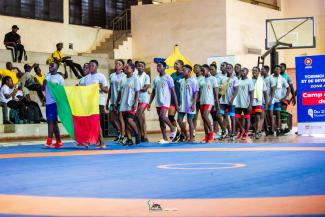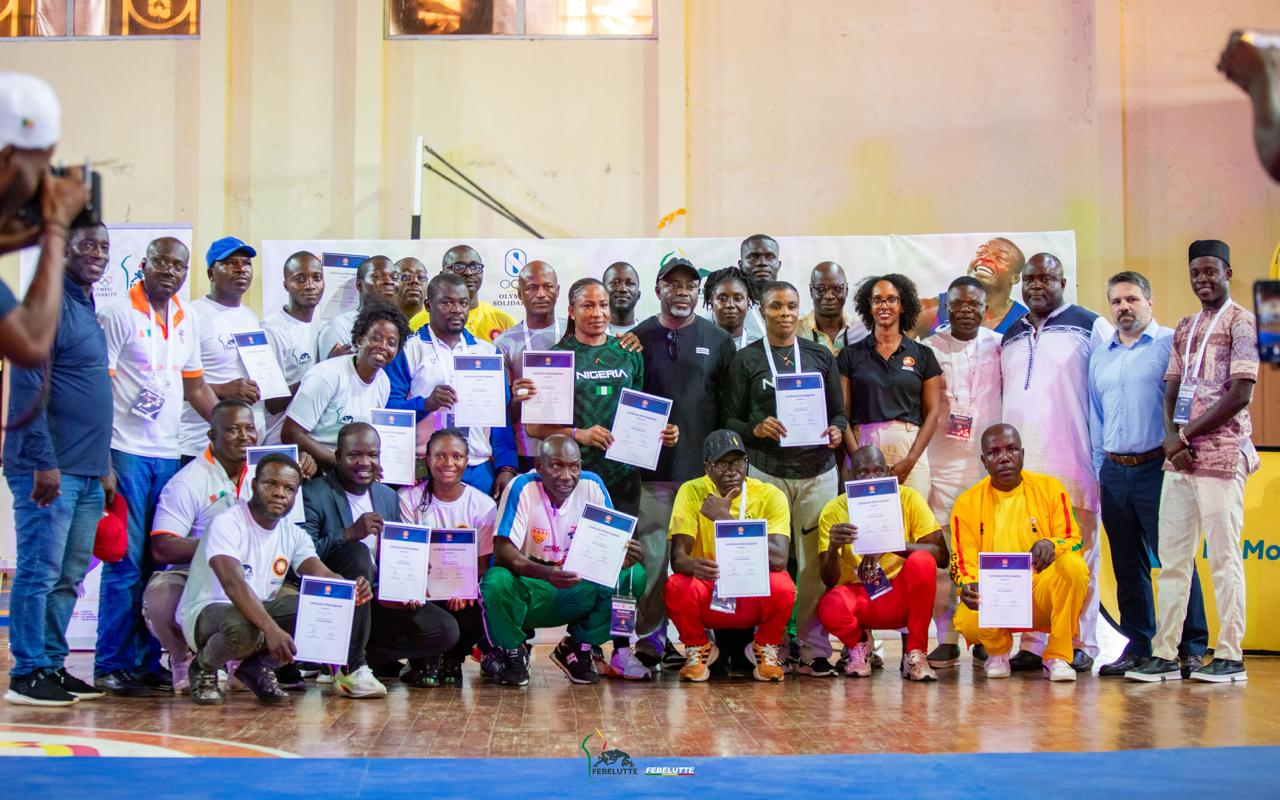Indonesia learns tricks of the trade in refereeing, coaching and IT
Thursday, June 29, 2023 - 14:49 By United World Wrestling Press

JAKARTA, Indonesia (June 29) -- The Indonesia Wrestling Federation recently hosted three comprehensive courses ahead of its national championships in Jakarta. From June 21 to 25, these courses took place at the Gedung Olahraga Universitas Negeri Jakarta.
Conducted in collaboration with United World Wrestling, Olympic Solidarity, Indonesia NOC, and the Indonesia Wrestling Federation, the courses covered different areas of expertise. Vincent AKA led the coaching course, Zach ERRETT conducted the referee course, and Youssef BOUAZIZ organized the IT course.
The Level 1 Course (Introduction to Coaching and Safety), a technical course for coaches, had a total of 42 participants, consisting of 35 men and seven women. Throughout the course, the coaches delved into various topics, including discovery games, introducing new techniques, coaching skills, providing feedback, risk management, and understanding age and developmental stage characteristics. The coaches actively practiced and honed their skills through practical evaluations, establishing a solid foundation for effective coaching methods that can be implemented in their respective provinces.
"The coaches and referees came together to work as a team," Aka said. "We tried to provide the skills that they need to be successful in their jobs and as a federation. Now, it needs to keep moving forward."
Hadi Rizky HANAFIAH, one of the participants, shared his newfound confidence as a coach.
“As a young coach, I feel more confident in managing my athletes and helping them to be the better wrestlers," the West Java coach said. "Hopefully UWW will be able to come to Indonesia so all Indonesian coaches can have valuable knowledge in the future."
 Participants during the Introduction to Referee course in Jakarta. (Photo: United World Wrestling)
Participants during the Introduction to Referee course in Jakarta. (Photo: United World Wrestling)
The Introduction to Refereeing Course had 19 participants, including 15 men and four women. The course focused on the fundamental aspects of being a referee, covering athlete safety, hold evaluation, referee mechanics, positioning, and bout control. Zach ERRETT commended the referees for their hard work and improvement throughout the course.
“The course went very well," Errett said. "The referees worked hard and showed improvement by the final day. The group was eager to learn and very receptive to feedback. It was great to watch them apply their skills successfully during the competition," he said.
The IT Course, attended by 20 participants, provided insight into the workings of the UWW's IT system during international competitions and continental championships. The participants gained knowledge about BlockChain draw, streaming tools, and the dissemination of public information. They also had the opportunity to design an IT setup for a simulated competition.
"This was my second course as an IT Educator in Southeast Asia," Bouaziz said. "There are many young people around the world, especially in SEA, who want to learn and work in event management. The participants asked many questions about the details of the programs and their functionalities. I was delighted that there were 20 participants in the course and I hope that we can conduct more courses to prepare the next generation for wrestling's future technological advancements."
 Participants of the three courses implementing their skills during the U20 National Championships in Jakarta. (Photo: United World Wrestling)
Participants of the three courses implementing their skills during the U20 National Championships in Jakarta. (Photo: United World Wrestling)
Following the courses, the Indonesia Wrestling Federation organized the U20 national championships, attracting 157 participants who competed in 200 bouts. This competition provided coaches and referees with the opportunity to apply their newly acquired skills. The IT course participants took the lead in organizing the competition system.
“The IT course will help the Indonesia Federation IT Division," Ronny GUNAWAN, IT Chairman of IWF, said. "We were able to share and learn about the latest developments in IT. Sharing knowledge in Indonesia can be challenging because we live in various provinces spread across islands. Hopefully, we can have future courses with UWW to further enhance our capabilities."



Share your thoughts.
Comments